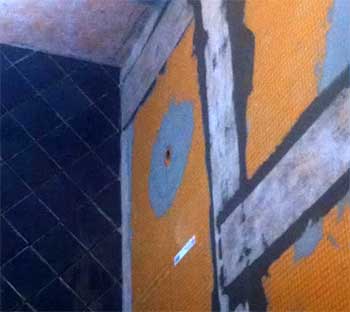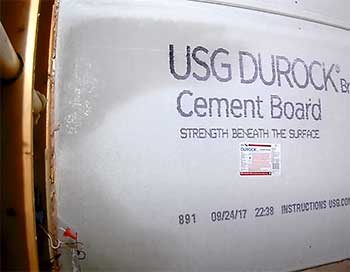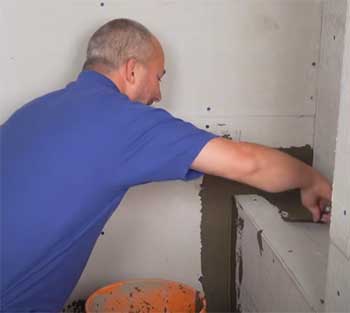Your shower is the place where it will be most exposed to the water and ultimately end up getting wet. So, to ensure longevity you need to pick the suitable material for backing up the tiles on the surface.
Though most people go for having drywall, if you are confused between water-resistant drywall vs. cement board, then this blog post is for you.
By having a read of this article, you will be able to decide which one is going to be the suitable one for your shower and other parts of the bathroom.
So, let’s get started.
Drywall or Cement Board: A Quick Comparison Table
Here are the main differentiating factors between the two in a brief format without getting to know about them in detail.
So, here you go.
| Specifications | Water-Resistant Drywall | Water-Resistant Cement Board |
| Availability | It is more available than the cement board. | It is not as available as the drywall. |
| Surface pattern | Drywall comes with more thickness and patterns. | It is comparatively plain on the surface. |
| Price | Drywall is comparatively cheaper. | The price of the cement board is higher compared to drywall. |
| Easiness of installation | Drywall is easy for installation as the process is simple. | Cement board installation is not as easy as drywall. |
| Less risky | For the lightweight of the panel, the workers are less exposed to accidents. | It is more heavyweight as a result there lie some possibilities of injuries. |
| Strong base | It is not as strong as a cement board for tile installation. | It offers a very strong base during the tile installation. |
| For emergency repair | You can do any emergency repair within a short time. | It needs hours of preparation and the overall process takes time. |
| Easy transportation | Due to the lightweight, the transportation process during the installation job is not troublesome. | The transportation is not as easy as the drywall. |
| Fire protection | It is not as fire-resistant as the cement board. | It provides extra protection for fire. |
I am sure by now you have got some idea regarding the differentiating factors between drywall and cement board. Though both serve a similar purpose, one of these is harder than the another.
Want to know about the significant differentiating factors in detail? Then the next section of the blog post is for you.
Key Differences Between Water Resistant Drywall and Cement Board
Now you know the key differentiating aspects in brief, but for mitigating your curiosity regarding cement board or drywall in the bathroom, you will get to know about all those mentioned aspects in detail in this part.
- Availability

You will mostly see people using drywall for their bathroom rather than cement board, mostly. It is because of its availability of it.
Drywall is widely available around the country and quite popular.
But cement board is not as available as the drywall, as a result, people tend to be more invested in the other counterpart.
- Pattern Of The Surface
Drywall is thick when you compare it with the cement board. There are so many patterns on the surface of the drywall when you look at it closely.
But cement boards do not come with the mentioned thickness like the drywall also the surface is also relatively plain.
- Pricing Comparison
Pricing plays an impactful role when you are thinking about purchasing something. So, when you are on a tight budget, you are most likely to prefer the drywall.
The reason is that drywall is significantly cheaper to avail. But cement board comes with a higher price. So, before taking it into the consideration, people will think about so many things to validate the investment.
Having a cheaper price is another reason why people are keener to purchase drywall for their bathroom or kitchen while not considering the other available alternatives.
- Easiness Of Installation
When you hire a professional for drywall installation, then you will get to know that the process of drywall installation is really simple not taking much time and effort for them for years and years of practice.
On the other hand, it would take significant effort to do the installation job of the cement board.
- Less risky
As the drywall panels are light, the chances of the workers getting hurt during the installation job are very low. On the other hand, there are several cases of injuries in the case of working with the cement board.
- Strong base
When you pick the cement board, you will get a very strong base while doing the tile installation. But this strong base will not be there when there is drywall instead of cement board.
- Emergency repair

You may need to work on the wall surface of the bathroom and kitchen on an urgent basis sometimes.
In such urgent need, working with the drywall is the best option to do.
You can do the repair job in the shortest possible time this way.
But for the cement board, it will take a significant amount of time, money, and effort.
- Easiness of Transportation
Due to having significantly lightweight, it would be extremely easy to transport the drywall to the destination. But it would be the opposite for the cement board.
It would take more labor and therefore will cost you more money.
- Fire Protection And Heat Resistance
Needless to say, despite having some disadvantages, the cement board is hardy. It can resist fire to a great extent also it can resist heat as well. This feature does not go with the drywall, though.
So, these are some significant differentiating aspects of the drywall and cement board. I hope by now you have decided about the ideal one for you.
Which One Stands Out For Your Bathroom?

As you can see, there is some significant difference between drywall and cement board.
Now the decision comes to you. How long can you visualize yourself utilizing the toilet? Is it for the long term or short time?
If you are thinking long-term, then I would suggest you go for the hardiness of the cement board, if you find it available.
If you are thinking short time, then drywall should be the best option to meet your need.
Either way, it is you who is going to take the final decision, according to your budget and planning.
Frequently Asked Questions (FAQs)
Though cement boards are not waterproof they are water-resistant.
Some people may always prefer having drywall for the wall and ceiling of their bathroom and kitchen. But is true that cement board can be a perfect alternative to that as well.
The idea is to make a semi-cement tile backer that isn’t as sturdy as cement but makes up for cost-effectiveness and flexibility.
Cement boards have better longevity than gypsum panels. It is also resistant to mildew and mold.
Wrapping Things Up
If you know about your requirement, I am sure by now you know which one you should pick regarding water-resistant drywall vs. cement board.
Drywall is the most available and uncomplicated one, whereas you cannot deny the robustness of the cement board for longevity.
I am sure you are going to pick the most suitable one to serve your purpose.
Cheers!
